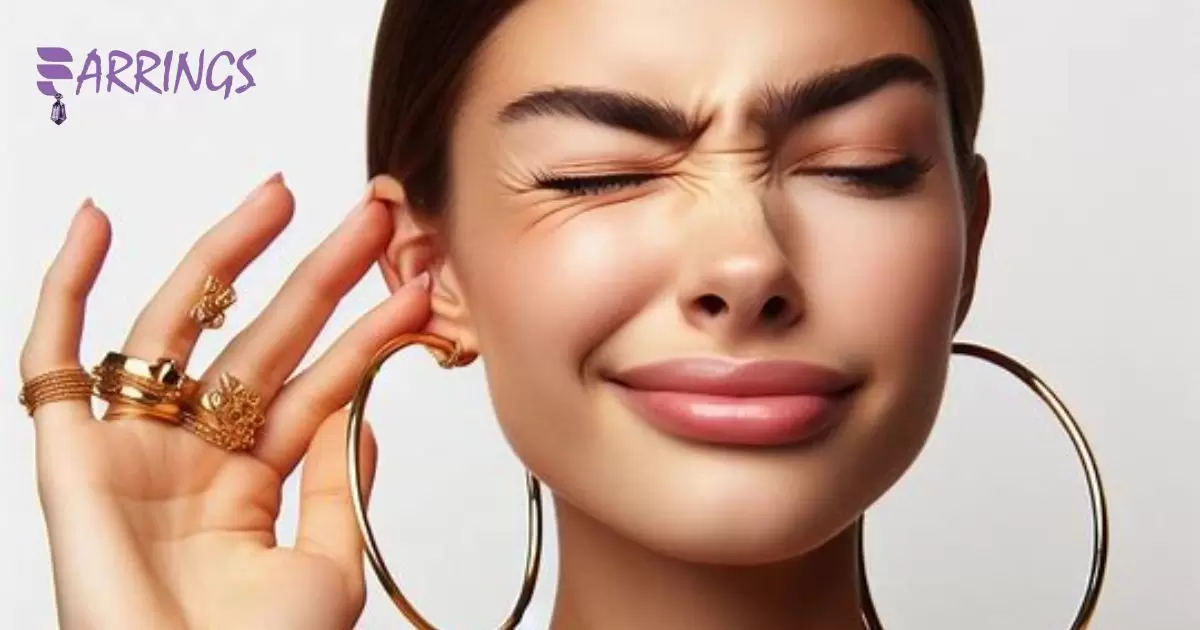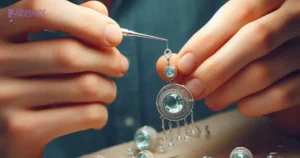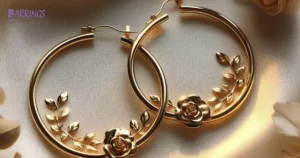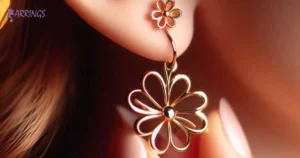Wearing earrings can cause skin irritation for some people leading to red, inflamed earlobes that feel tingly and itchy this reaction is likely caused by an allergy to certain metals in the earring posts or wires touching the sensitive skin on earlobes.
Metal allergies are common but confusing. Nickel, gold, silver all can irritate our skin. So can cheap metals. Why do earrings make my ears itch? The post touching our sensitive lobe likely contains a problematic ingredient. Just one small part causes big irritation. Identifying the culprit brings relief.
Earlobes have sensitive skin. Many metals irritate, like nickel and copper. Cheap earrings often use those. Even expensive ones can bother. Girls like guys with earrings. Finding options without irritants takes testing. Gold or titanium reduce the itching.
Key Takeaway
- Persistent ear itching with earrings may be due to metal allergies or low-quality materials.
- Opt for hypoallergenic earrings made of materials like surgical stainless steel or titanium.
- Regularly clean earrings to prevent debris accumulation that can cause irritation.
- Infections, especially in newly pierced ears, can contribute to itching follow proper care instructions.
- Avoid inserting objects into the ears and consult a healthcare professional if itching persists for proper evaluation.
Common Causes Of Ear Itching When Wearing Earrings
Earrings might itch due to nickel allergies or low-quality materials. Clean earrings and earlobes to prevent infections. Try hypoallergenic metals like stainless steel or gold. If irritation persists, see a doctor for advice.
Allergic Reactions To Metals
Metal allergies can cause ear itching with earrings. Nickel, often found in cheap earrings, is a common culprit. Opt for hypoallergenic metals like stainless steel or gold to ease irritation.
Sensitivity To Earring Backs
Earring backs can also trigger ear itching. Some people are sensitive to the materials in the backs. Opt for earring backs made from hypoallergenic materials if irritation occurs. Keeping them clean is essential for preventing discomfort.
Poor Earring Hygiene
Dirty earrings gather sweat and bacteria, causing itchy ears. Regular cleaning prevents irritation and maintains ear health. Neglecting earring hygiene is a common cause of ear itching.
Tarnished Earrings
Tarnished earrings can cause ear itching due to the metal’s reaction with the skin. The tarnish, often a result of exposure to air and moisture, may contain irritants. Regular cleaning and choosing earrings made of non-tarnishing materials can help prevent discomfort.
Bacterial Or Fungal Infections
Common causes of ear itching when wearing earrings include bacterial or fungal infections. Poor hygiene or using unclean earrings can introduce bacteria, leading to infections. If you notice persistent itching, redness, or discharge, consult a healthcare professional for proper diagnosis and treatment.
Earlobe Dermatitis
Wearing earrings can make your ears itch. Earlobe dermatitis is a common cause. It happens when your skin reacts to metals like nickel. Choosing hypoallergenic earrings may help. Clean your earrings regularly to prevent irritation. Tight earrings or friction can also make your ears itch. If itching persists, see a healthcare professional.
Ear Piercing Infection
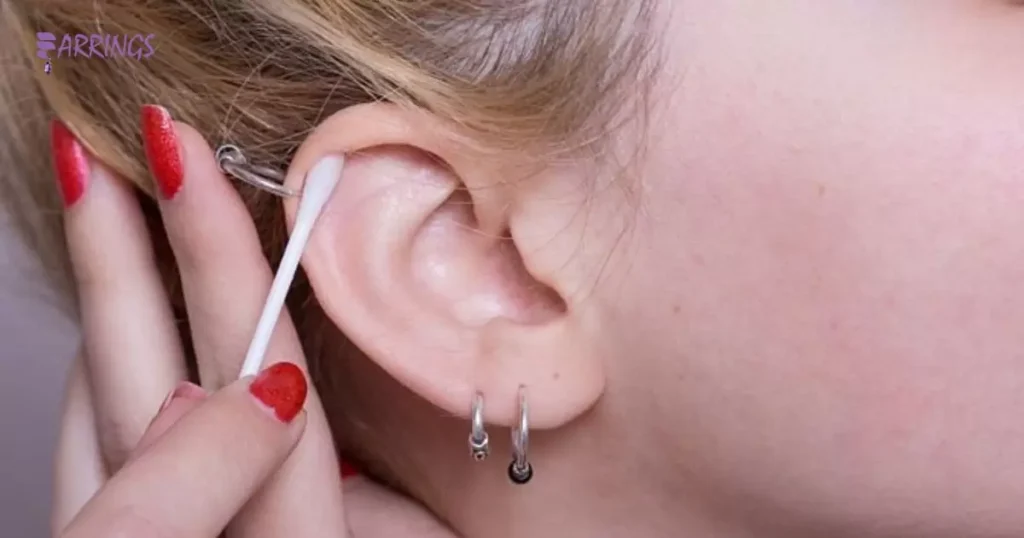
If you suspect an ear piercing infection, look out for signs like redness, swelling, or pus around the piercing site. Itching and pain can also indicate an infection. Clean the area twice daily with saline solution or mild soap and water. Avoid touching the piercing with dirty hands to prevent further irritation.
If symptoms worsen or persist, seek medical attention promptly. In some cases, antibiotics may be necessary to treat the infection effectively. Remember to follow your piercer’s aftercare instructions carefully to promote healing and reduce the risk of infection.
Earring Hole Infection
An earring hole infection can occur due to bacteria entering the piercing site. Symptoms include redness, swelling, pain, and discharge. Poor hygiene or wearing earrings made from low-quality materials can increase the risk.
Cleaning earrings regularly with mild soap and water can help prevent infections. If an infection develops, remove the earring and clean the area with saline solution. Apply antibiotic ointment and see a doctor if the infection worsens or doesn’t improve within a few days.
Allergic Reactions To Earrings
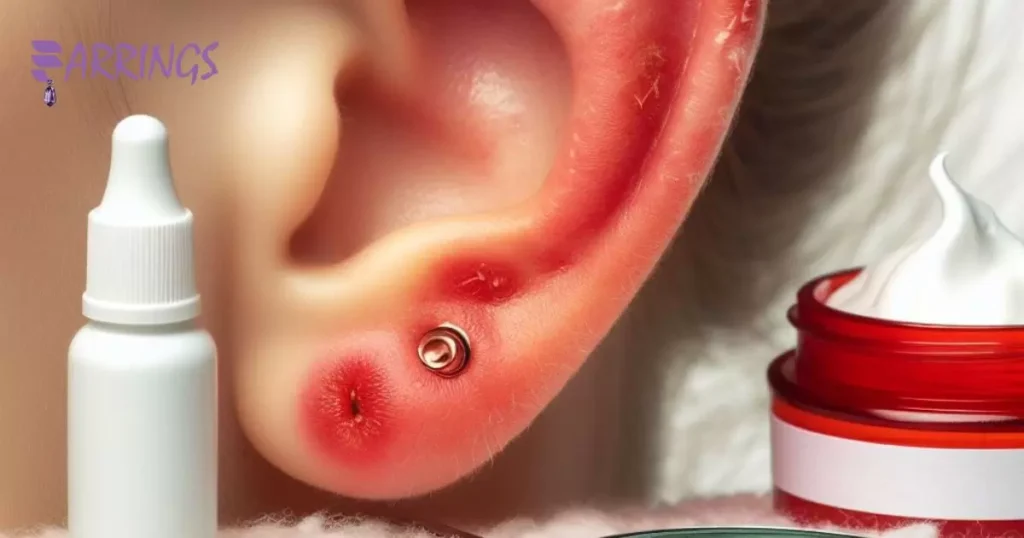
Earring allergy, often triggered by nickel, causes itching and redness. Choose hypoallergenic earrings like titanium or gold to avoid reactions.
Allergic responses can lead to itching, redness, or swelling. Regular cleaning helps prevent these reactions. If symptoms persist, consult a healthcare professional for guidance.
Tips For Preventing And Managing Ear Itching From Earrings
Choose Hypoallergenic Earrings: Opt for earrings made from materials like surgical stainless steel, titanium, or gold to minimize the risk of allergic reactions, especially if you’re sensitive to nickel.
Regular Cleaning: Keep your earrings clean to prevent the accumulation of dirt, bacteria, or debris, which can contribute to itching and irritation. Use a mild cleaning solution and ensure proper hygiene.
Proper Hygiene: Practice good hygiene when wearing earrings. Clean your earlobes regularly, and avoid wearing earrings for extended periods to reduce the chances of irritation.
Avoid Tight Earrings: Opt for earrings that fit comfortably and avoid overly tight ones, as they can cause friction and irritation. Ensure your earrings don’t move excessively to prevent rubbing against the skin.
Consider Earring Material: Be mindful of the materials used in plated earrings. If the plating wears off, the base metal might cause irritation. Choose quality earrings to avoid this issue.
Seek Professional Advice: If you experience persistent itching or irritation, consult with a healthcare professional or dermatologist for personalized guidance and appropriate treatment.
Listen to your body and make adjustments accordingly to ensure a comfortable and irritation-free experience with your earrings.
Cleaning And Maintaining Earrings To Prevent Ear Itching
To prevent ear itching, clean earrings regularly. Use mild soap and water, and dry them well. This removes dirt and bacteria, reducing the risk of irritation.
Choose hypoallergenic earrings to avoid metal allergies. Ensure earrings fit well to prevent friction. If itching persists, consult a professional for advice. Taking care of your earrings means taking care of your ears.
Dry Skin In The Ears
Dry skin in the ears can be bothersome. Lack of moisture causes flakiness and itching. To prevent it, stay hydrated and use a gentle moisturizer. If the problem persists, consult a healthcare professional for advice.
Dry ears can also result from excessive cleaning. Avoid using cotton swabs too often. Keep your ears clean and moisturized for comfort.
Conditions That Cause Itchy Skin
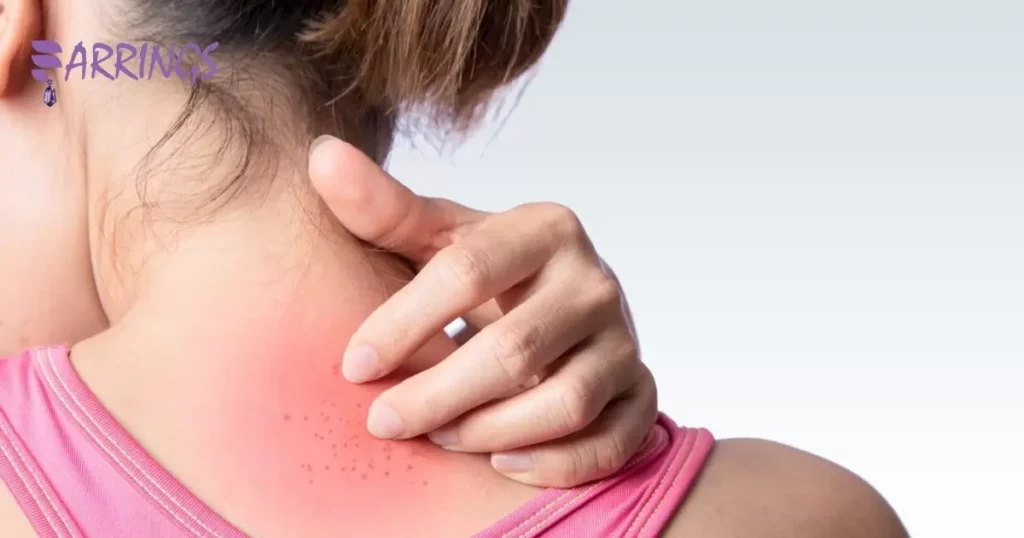
| Skin Conditions | General Recommendations |
| Dry Skin | Keep skin moisturized Avoid excessive cleaning |
| Allergies | Identify and avoid triggers Consult a dermatologist |
| Eczema | Use prescribed medications Keep skin moisturized |
| Psoriasis | Follow prescribed treatments Maintain good hygiene |
| Other Dermatological Issues | Consult a dermatologist for diagnosis and treatment |
| Allergic Reactions | Identify and avoid allergens Use hypoallergenic products |
| Poor Hygiene | Practice good hygiene habits Regularly clean skin |
| Excessive Cleaning | Avoid overusing harsh cleansers Use gentle skincare |
Itchy skin can result from various conditions. Dry skin is a common culprit keeping it moisturized helps. Allergies to certain foods or substances may also cause itching.
Skin conditions like eczema or psoriasis contribute to persistent itchiness. Identifying the specific cause helps in effective treatment. Consulting a dermatologist is advisable for persistent or severe itching.
Frequently Asked Questions
What type of earrings are best for sensitive ears?
Hypoallergenic earrings made from materials like surgical stainless steel, titanium, or gold are best for sensitive ears. These materials minimize the risk of allergic reactions and irritation.
How do I stop being allergic to earrings?
To stop being allergic to earrings, choose hypoallergenic materials like titanium or gold. Avoid nickel-containing jewelry, keep earrings clean, and consult a dermatologist for personalized advice.
How do I stop the inside of my ear from itching?
To stop inside ear itching, avoid inserting objects, and use a gentle ear cleanser. If the itching persists, consult a healthcare professional for proper evaluation and guidance.
Conclusion
Metal allergies explain itchy, irritated earlobes. Nickel and other cheap metals often cause this reaction. Look for higher quality posts or hypoallergenic earrings. Pure gold, titanium, niobium and surgical steel options will reduce this sensitivity. Trying earrings one pair at a time can help identify irritants.
If no metals provide relief, the culprit could be nickle plating or other coatings. Remove backings after wearing to let skin breathe. Clean earrings and piercings daily. Consult a dermatologist for allergy testing or treatments if swapping jewelry doesn’t stop the itching. Protecting sensitive piercings is key.
